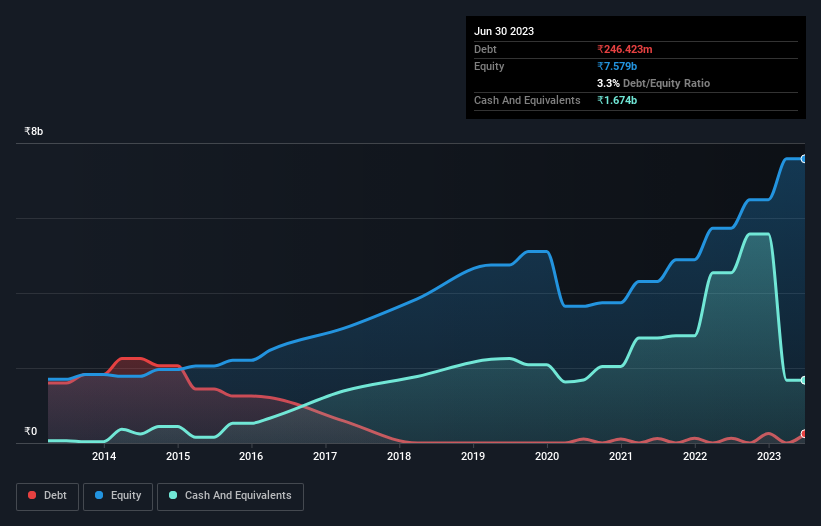- India
- /
- Auto Components
- /
- NSEI:SHARDAMOTR
Here's Why Sharda Motor Industries (NSE:SHARDAMOTR) Can Manage Its Debt Responsibly
David Iben put it well when he said, 'Volatility is not a risk we care about. What we care about is avoiding the permanent loss of capital.' So it might be obvious that you need to consider debt, when you think about how risky any given stock is, because too much debt can sink a company. We note that Sharda Motor Industries Limited (NSE:SHARDAMOTR) does have debt on its balance sheet. But should shareholders be worried about its use of debt?
Why Does Debt Bring Risk?
Debt and other liabilities become risky for a business when it cannot easily fulfill those obligations, either with free cash flow or by raising capital at an attractive price. Ultimately, if the company can't fulfill its legal obligations to repay debt, shareholders could walk away with nothing. While that is not too common, we often do see indebted companies permanently diluting shareholders because lenders force them to raise capital at a distressed price. By replacing dilution, though, debt can be an extremely good tool for businesses that need capital to invest in growth at high rates of return. When we think about a company's use of debt, we first look at cash and debt together.
See our latest analysis for Sharda Motor Industries
How Much Debt Does Sharda Motor Industries Carry?
The image below, which you can click on for greater detail, shows that at March 2023 Sharda Motor Industries had debt of ₹246.4m, up from ₹124.6m in one year. However, it does have ₹1.67b in cash offsetting this, leading to net cash of ₹1.43b.

A Look At Sharda Motor Industries' Liabilities
Zooming in on the latest balance sheet data, we can see that Sharda Motor Industries had liabilities of ₹5.99b due within 12 months and liabilities of ₹323.8m due beyond that. On the other hand, it had cash of ₹1.67b and ₹3.31b worth of receivables due within a year. So its liabilities outweigh the sum of its cash and (near-term) receivables by ₹1.32b.
Of course, Sharda Motor Industries has a market capitalization of ₹29.6b, so these liabilities are probably manageable. Having said that, it's clear that we should continue to monitor its balance sheet, lest it change for the worse. While it does have liabilities worth noting, Sharda Motor Industries also has more cash than debt, so we're pretty confident it can manage its debt safely.
And we also note warmly that Sharda Motor Industries grew its EBIT by 15% last year, making its debt load easier to handle. There's no doubt that we learn most about debt from the balance sheet. But it is Sharda Motor Industries's earnings that will influence how the balance sheet holds up in the future. So if you're keen to discover more about its earnings, it might be worth checking out this graph of its long term earnings trend.
But our final consideration is also important, because a company cannot pay debt with paper profits; it needs cold hard cash. While Sharda Motor Industries has net cash on its balance sheet, it's still worth taking a look at its ability to convert earnings before interest and tax (EBIT) to free cash flow, to help us understand how quickly it is building (or eroding) that cash balance. Over the last three years, Sharda Motor Industries barely recorded positive free cash flow, in total. Some might say that's a concern, when it comes considering how easily it would be for it to down debt.
Summing Up
While it is always sensible to look at a company's total liabilities, it is very reassuring that Sharda Motor Industries has ₹1.43b in net cash. And it also grew its EBIT by 15% over the last year. So we don't have any problem with Sharda Motor Industries's use of debt. The balance sheet is clearly the area to focus on when you are analysing debt. However, not all investment risk resides within the balance sheet - far from it. Be aware that Sharda Motor Industries is showing 1 warning sign in our investment analysis , you should know about...
If you're interested in investing in businesses that can grow profits without the burden of debt, then check out this free list of growing businesses that have net cash on the balance sheet.
New: Manage All Your Stock Portfolios in One Place
We've created the ultimate portfolio companion for stock investors, and it's free.
• Connect an unlimited number of Portfolios and see your total in one currency
• Be alerted to new Warning Signs or Risks via email or mobile
• Track the Fair Value of your stocks
Have feedback on this article? Concerned about the content? Get in touch with us directly. Alternatively, email editorial-team (at) simplywallst.com.
This article by Simply Wall St is general in nature. We provide commentary based on historical data and analyst forecasts only using an unbiased methodology and our articles are not intended to be financial advice. It does not constitute a recommendation to buy or sell any stock, and does not take account of your objectives, or your financial situation. We aim to bring you long-term focused analysis driven by fundamental data. Note that our analysis may not factor in the latest price-sensitive company announcements or qualitative material. Simply Wall St has no position in any stocks mentioned.
About NSEI:SHARDAMOTR
Sharda Motor Industries
Manufactures, assembles, trades in, and sells auto components to automobiles and electronics original equipment manufacturers in India.
Solid track record with excellent balance sheet and pays a dividend.
Market Insights
Community Narratives



